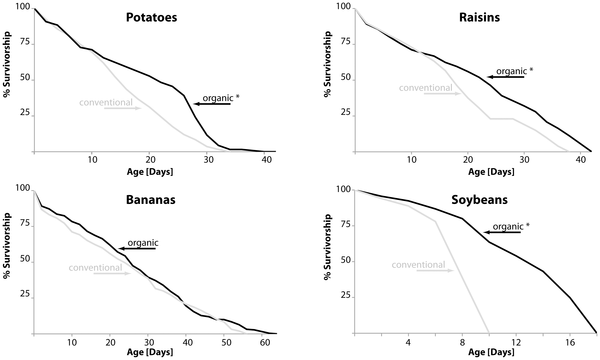A new study led by Ria Chhabra, a student at Clark High School in Plano, Texas, set out to see if organic food is healthier than conventional food - and it was. In fruit flies. With some conditions.
Chhabra sought to conduct the experiments after hearing her parents discuss whether it's worth it to buy organic foods. Southern Methodist University biologist Johannes H. Bauer, principal investigator for the study, mentored Chhabra by helping guide and design her research experiments. The research focus of Bauer's fruit fly lab is nutrition and its relationship to longevity, health and diabetes.
"While these findings are certainly intriguing, what we now need to determine is why the flies on the organic diets did better, especially since not all the organic diets we tested provided the same positive health outcomes," said Southern Methodist University biologist Johannes H. Bauer, principal investigator for the study.
"We don't know why the flies on the organic diet did better. That will require further research. But this is a start toward understanding potential health benefits," said Chhabra.
Biology researchers at Southern Methodist University, Dallas, wanted to know if organic food is healthier than conventionally grown food. To test that, they fed one group of fruit flies an organic diet and a second group a conventional diet. Credit: SMU
Flies on organic food performed better on some health tests."The data demonstrated that flies raised on organic food extracts by-and-large performed better on the majority of health tests," reported the researchers.
It remains unclear why organic diets delivered better health, they said.
While a few studies have shown elevated nutrient content and lower pesticide contamination levels in organic food, a recent publication reporting a large-scale analysis of all available studies concluded no clear trend was apparent.
Fruit flies were fed extracts from produce purchased at a grocery store
In order to investigate whether organic foods are healthier for consumers, the lab utilized one of the most widely used model systems, the fruit fly Drosophila melanogaster. Because of the low costs associated with fly research and the fly's short life cycle, researchers use fruit flies to study human diseases, everything from diabetes to heart function to Alzheimer's disease.
The Bauer lab fruit flies were fed organic and nonorganic produce purchased from a leading national grocery retailer of organic and conventional foods. The flies were fed extracts made from organic and conventional potatoes, soybeans, raisins and bananas. They were not fed any additional nutritional supplements. The researchers tested the effects of each food type independently and avoided any confounding effects of a mixed diet.
The health tests measured longevity, fertility, stress and starvation resistance.

Longevity of D. melanogaster fed organic diets. Survivorship curves of female fruit flies fed diets made from extracts of potatoes, raisins, bananas or soybeans (grey: conventional food; black: organic food; statistically significant changes (p<0.005) are indicated by asterisks). Median survival times of flies on conventional and organics food sources, respectively, are: potatoes: 16 and 22 days (~38% longevity increase, p<0.0001); raisins: 2 and 24 days (~20% longevity increase, p<0.0001); bananas: 24 and 26 days (p = 0.1543); soybeans: 8 and 14 days (~75% longevity increase, p<0.0001). Credit: doi:10.1371/journal.pone.0052988.g001
Some negative or neutral results were obtained using diets prepared from organic raisins, which suggests the beneficial health effects of organic diets are dependent on the specific food item, Bauer said. That might explain some of the inconsistent results in the published studies in the scientific literature, he said, noting some studies suggest there is a nutritional benefit from organic food, while others suggest there is not.
"To our surprise, in the majority of our tests of flies on organic foods, the flies fed organic diets did much better on our health tests than the flies fed conventional food," Bauer said. "Longevity and fertility are the two most important aspects of fly life. On both of these tests, flies fed organic diets performed much better than flies fed conventional diets. They lived longer, had higher fertility, and had a much higher lifetime reproductive output."
Factors such as soil condition and latitude where the produce was grown weren't considered, mimicking a typical grocery store shopping experience.
Citation: Chhabra R, Kolli S, Bauer JH (2013) Organically Grown Food Provides Health Benefits to Drosophila melanogaster. PLoS ONE 8(1): e52988. doi:10.1371/journal.pone.0052988




Comments